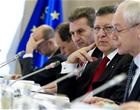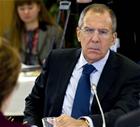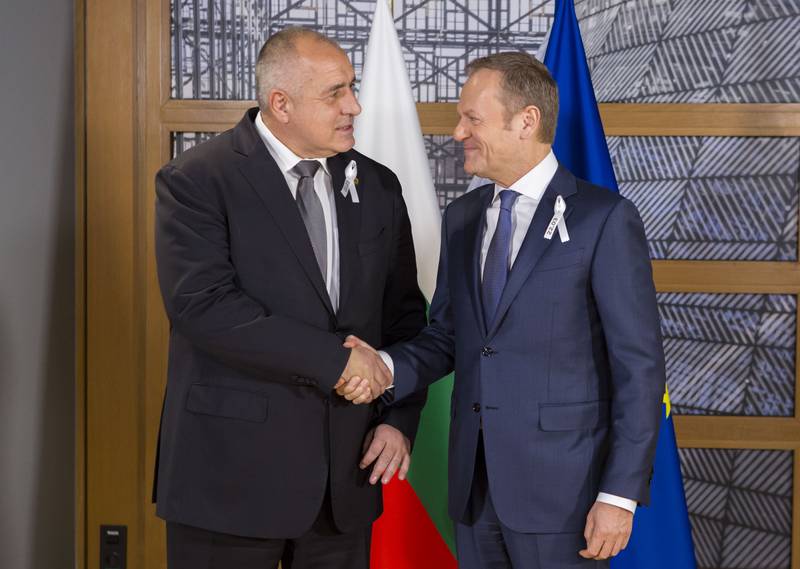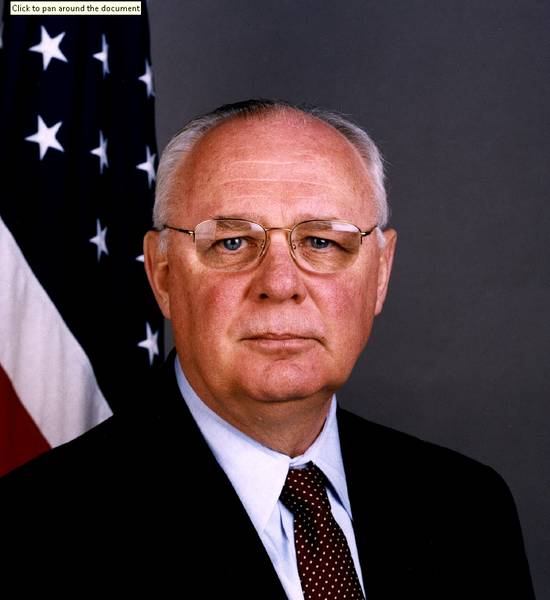The EU-Russia Relations Were at Their Highest Level
Adelina Marini, December 19, 2011
 "A very successful summit", "a summit of results", "very honest discussions", "our partnership is strategic and deserves the best of assessments". With such words of praise started the news conference after the end of the regular EU-Russia summit in Brussels, in which took part the EU leaders, Jose Manuel Barroso and Herman Van Rompuy, and Russia's President Dimitry Medvedev, who is expected to leave next year when there will be presidential elections. A coincidence or not, but in the same day of the summit (December 15) the annual questions and answers session of Vladimir Putin, Russia's PM, took place, which lasted more than 4 hours and ended literally minutes before Medvedev's news conference to start in Brussels.
"A very successful summit", "a summit of results", "very honest discussions", "our partnership is strategic and deserves the best of assessments". With such words of praise started the news conference after the end of the regular EU-Russia summit in Brussels, in which took part the EU leaders, Jose Manuel Barroso and Herman Van Rompuy, and Russia's President Dimitry Medvedev, who is expected to leave next year when there will be presidential elections. A coincidence or not, but in the same day of the summit (December 15) the annual questions and answers session of Vladimir Putin, Russia's PM, took place, which lasted more than 4 hours and ended literally minutes before Medvedev's news conference to start in Brussels.
Beyond praise
The summit took place in severe times for both sides, as European Council President Herman Van Rompuy also noted. The EU is being shaken by the constantly unfolding debt crisis in the eurozone and is on the way to open a new page in its history. Russia, on its part, while thinking that the model president Medvedev-premier Putin will smoothly be turned into president Putin-premier Medvedev, the system started to crack. First was the blow with the much less electoral support (compared to previous  elections) for the ruling United Russia party, at the parliamentary elections in the beginning of December. Then reports appeared for irregularities and fraud, which unleashed a wave of protests.
elections) for the ruling United Russia party, at the parliamentary elections in the beginning of December. Then reports appeared for irregularities and fraud, which unleashed a wave of protests.
In this sense, indeed, the summit looked sincere. Mr Van Rompuy started with the words that "both the EU and Russia are at important crossroads. The political and economic developments have continued transforming the global and domestic landscape rapidly. We, the EU, are manoeuvring our way through the sovereign debt crisis". The European president listed briefly all the measures that had been agreed at the last European Council on December 8-9 and went on: "The questions and tasks facing Russia are equally demanding. You have set an ambitious vision for Russia's modernisation in the 21st century. A vision based on a modern economy and ensuring further political reform". In the same time, Herman Van Rompuy added, the EU was concerned by the irregularities and the lack of fairness, reported by the OSCE and part of the civil society.
"We, therefore, welcome your pledge and commitment, Mr. President, to investigate in a fair and impartial manner reports about electoral problems", Mr Van Rompuy noted.
 The Russian head of state did not remain indebted to the criticism, by noting that during the conversation, as usually, the issue of human rights was discussed. In his words, though, there were problems as in Russia, so in the EU. "But there are problems in the European Union as well, there are problems with the respect of the rights of the Russian-speaking minorities in a number of countries, and also known by all facts of xenophobia, extremism and neonazism in many EU member states. We should not close our eyes before that and we should fight it".
The Russian head of state did not remain indebted to the criticism, by noting that during the conversation, as usually, the issue of human rights was discussed. In his words, though, there were problems as in Russia, so in the EU. "But there are problems in the European Union as well, there are problems with the respect of the rights of the Russian-speaking minorities in a number of countries, and also known by all facts of xenophobia, extremism and neonazism in many EU member states. We should not close our eyes before that and we should fight it".
Economic coolness
And while regarding human rights, of which Mr Medvedev said were one of the most  important topic in the Russian-European cooperation, a desire for equality could be felt on behalf of Russia - in other words, yes, we do have problems but you have problems too and stop bossing on us - in the economic sphere the situation was definitely to Russia's benefit. Responding to a question about whether Russia would help the EU to tackle the eurozone crisis, Medvedev spoke in a much more assured manner and said that his country was interested the Union to remain a strong economic and political power, "because we have deep civilisational and, of course, mutually beneficial relations and this is why for us united Europe is important". He praised the leaders for managing to agree and to keep "everything that has been built for the past 10 years" and most of all the euro. "We are all interested in this. After all 41% of our currency reserves are in euro or in bonds denominated in euro", Medvedev explained.
important topic in the Russian-European cooperation, a desire for equality could be felt on behalf of Russia - in other words, yes, we do have problems but you have problems too and stop bossing on us - in the economic sphere the situation was definitely to Russia's benefit. Responding to a question about whether Russia would help the EU to tackle the eurozone crisis, Medvedev spoke in a much more assured manner and said that his country was interested the Union to remain a strong economic and political power, "because we have deep civilisational and, of course, mutually beneficial relations and this is why for us united Europe is important". He praised the leaders for managing to agree and to keep "everything that has been built for the past 10 years" and most of all the euro. "We are all interested in this. After all 41% of our currency reserves are in euro or in bonds denominated in euro", Medvedev explained.
As regards assistance, though, he specified in details that Russia was sticking to its commitments as a member of the International Monetary Fund and was ready to invest its share in support for the European economy and the eurozone. "We are ready to consider other measures of support but it is obvious that the most important thing are the decisions the member states will take. In the end of the day Europe can help itself, but other countries are also obliged to create conditions, so that Europe could release itself from this crisis development faster. We will assist that", the Russian head of state added, without giving any details.
 Dmitry Medvedev changed the tone even more when he was asked about the European Parliament's call for new free and fair elections in Russia in the day before the summit. "The European Parliament has no relation to the elections. They can comment whatever they like. I will not comment their decisions, for me they mean nothing. But our, Russian parliament, in the face of various parties - parties that represent the majority and opposition parties too - yesterday, as far as I know, I watched via the internet, they expressed extreme disagreement with the position of the European Parliament, because it has to deal with its own European stuff. Look how many problems you have", the Russian president concluded.
Dmitry Medvedev changed the tone even more when he was asked about the European Parliament's call for new free and fair elections in Russia in the day before the summit. "The European Parliament has no relation to the elections. They can comment whatever they like. I will not comment their decisions, for me they mean nothing. But our, Russian parliament, in the face of various parties - parties that represent the majority and opposition parties too - yesterday, as far as I know, I watched via the internet, they expressed extreme disagreement with the position of the European Parliament, because it has to deal with its own European stuff. Look how many problems you have", the Russian president concluded.
As is the practise with Russian leaders, during news conferences with their participation the rule always is two questions for each side. There was no exception with Dmitry Medvedev in Brussels. But before that, Russian Prime Minister Vladimir Putin was answering for hours various questions during his already traditional and broadcast live sessions. Of course, he was asked about the relations with the EU, not by whoever but by his own biographer, the German citizen, a son of Russian immigrants  in Germany, Alexander Rar, who asked what mistakes had been made for the last 20 years so that the European integration of Russia not to happen.
in Germany, Alexander Rar, who asked what mistakes had been made for the last 20 years so that the European integration of Russia not to happen.
While asking his question, Mr Putin intervened to say: "Oh, the EU, it will again show up today". But later he pointed out that the lessons of the last 20 years were that Russia had to threaten less its neighbours, to get rid of its image of an empire, "which prevents Europe from cooperating with us,  because in Europe have been integrated many young Europeans, who continue to live with the stain of the past". He was obviously referring to the new member states, which are former soviet satellites. In the end of his prolonged answer Vladimir Putin said, however, that integration was possible and was wanted. But then, answering other questions, he said that Russia was not a bridge for anything. This was a self-sufficient power in the world, which is obviously a different way to perceive integration.
because in Europe have been integrated many young Europeans, who continue to live with the stain of the past". He was obviously referring to the new member states, which are former soviet satellites. In the end of his prolonged answer Vladimir Putin said, however, that integration was possible and was wanted. But then, answering other questions, he said that Russia was not a bridge for anything. This was a self-sufficient power in the world, which is obviously a different way to perceive integration.
The conclusion from this 28th summit between the EU and Russia is that the two sides talk more like equal partners. This is precisely the essence of the contradiction, at a first glance, that on the one hand it is talked about successes but on the other - the tone is sharp. This is so because a lot of the serious issues between them already find solutions. For example, after 18 years of negotiations Russia finally has become a member of the World Trade Organisation, for which Dmitry Medvedev thanked sincerely to the EU for the help and support.
Besides, during this summit has been launched the road map for a visa-free regime between the two sides. In the economic area there is obviously an understanding that the economies of the EU and Russia are interdependent and cooperation is preferable to confrontation. What can also be noticed is that the EU is riping for the idea to stop mentoring, while Russia is demonstrating acknowledgement of its weaknesses and is attempting to explain what it agrees with and what not. And this really takes the relations between the two sides to a brand new level.
 Boyko Borissov, Donald Tusk | © Council of the EU
Boyko Borissov, Donald Tusk | © Council of the EU Boris Johnson | © Council of the EU
Boris Johnson | © Council of the EU James W. Pardew | ©
James W. Pardew | ©